Turquoise, with its vibrant blue-green hues and natural vein patterns, has been revered as a calming and protective stone since ancient times.
Its color is so unique that the English language uses the word “turquoise” as the name of the greenish-light-blue color typical for high-quality turquoise.
A unique feature of turquoise is its natural matrix veins. These veins, often in brown or black, create unique patterns that make each stone one-of-a-kind.
Its earthy tones blend with sky blue as a symbol of the connection between earth and heaven. Turquoise holds spiritual significance in many cultures to this day.
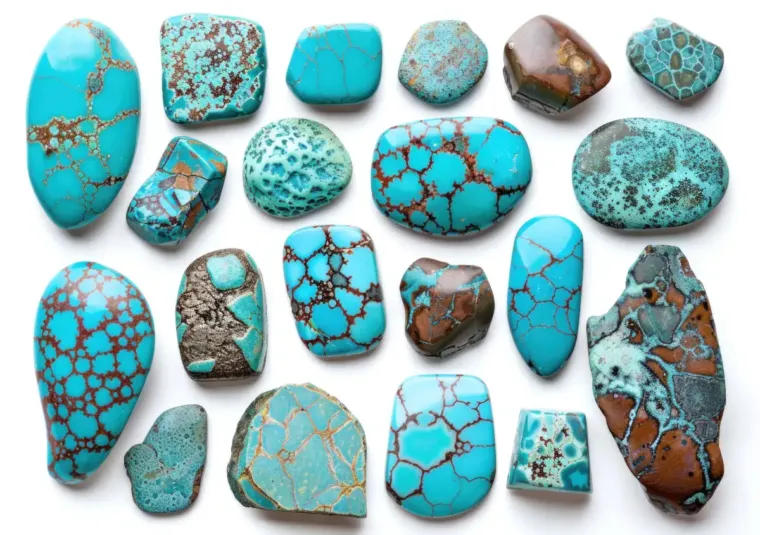
Table of Contents
Historical Significance of Turquoise
Turquoise gemstone has been popular for centuries. In Egyptian culture, it was believed to bring protection and healing. King Tutankhamun’s funerary mask sparkled with turquoise to protect his body in the afterlife.
The Aztecs revered turquoise, known as chalchihuitl, and considered it more valuable than gold or emeralds. Turquoise was closely linked to their gods, and many Aztec deities wore turquoise ornaments. Aztecs believed they were directly taught the art of cutting and polishing turquoise by their god Quetzalcoatl.
Native American tribes and indigenous cultures across the Americas used turquoise for centuries in jewelry and arts. It also plays a prominent role in many ceremonial rituals, giving it a spiritual significance.
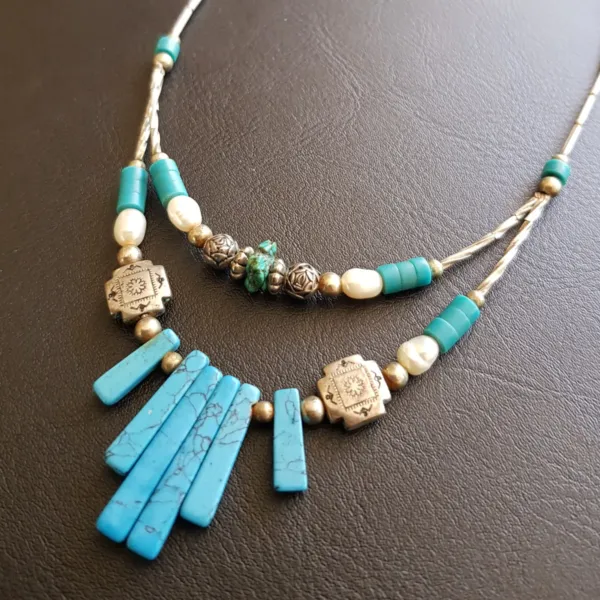
In Tibet, it’s more than just beautiful; it’s a national treasure symbolizing prosperity and happiness.
Turquoise, with its vibrant blue-green hue, is also an official December birthstone. It has been on the “official” Jewelers of America birthstone list since the very beginning in 1912.
Wallis Simpson, the Duchess of Windsor, famously wore a 1947 Cartier-designed necklace with amethysts, turquoise cabochons, and diamonds set in gold as a symbol of love.
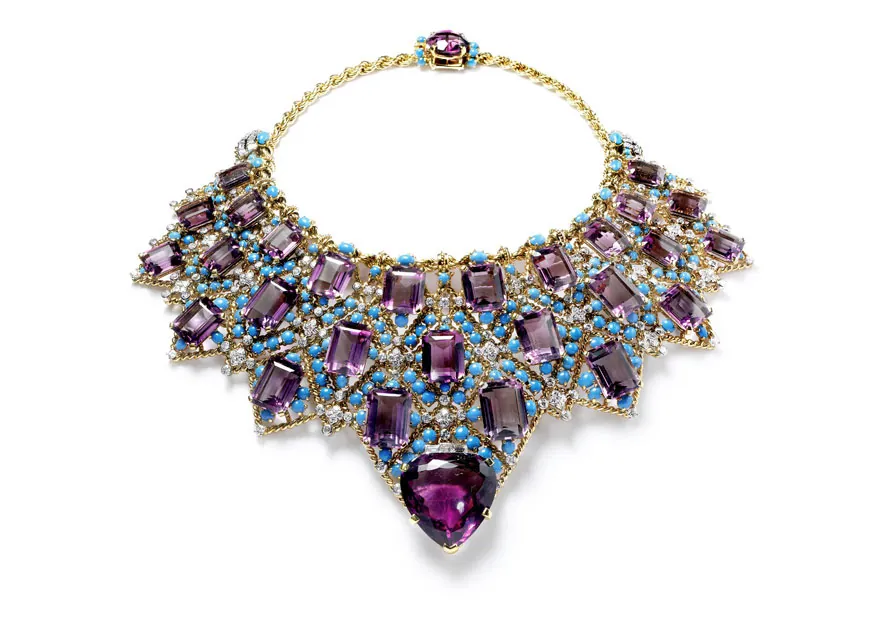
Image credit: Mrs Jones and Co. blog
Turquoise is a stone of tradition and timeless beauty.
Turquoise Meaning and Symbolism
Fun fact: The name “turquoise” originates from a French phrase, “pierre turquoise,” meaning “Turkish stone.” The first stones imported to France as early as the 17th century were traded via Turkey. However, they originated in the mountain mines in Iran. So, the name is a misnomer.
Healing Benefits of Turquoise
Known as the “peace stone, it is believed to provide emotional healing, helping individuals process trauma, dissolve self-sabotage, and find inner peace and balance.
In today’s stressful world, many use turquoise as a calming influence. It helps to relieve stress and restores depleted vitality.
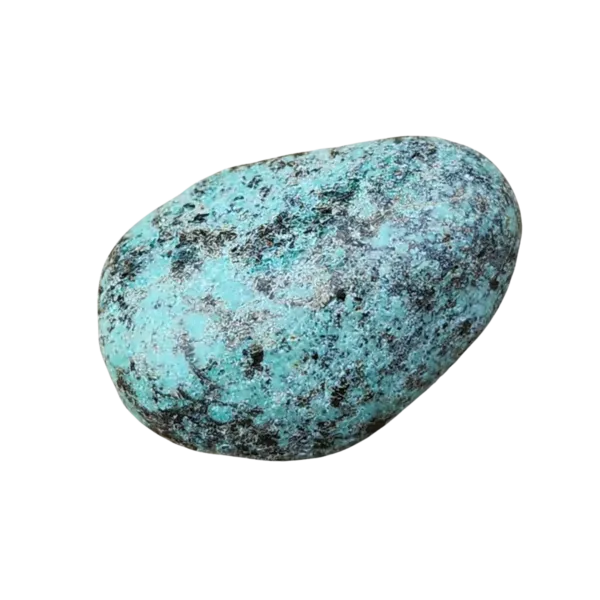
Metaphysical Properties of Turquoise
From ancient times until today, turquoise is widely regarded as a protective stone. Ancient Mayans wore turquoise talismans to protect themselves from demons and injuries.
Many still view turquoise as a protective charm against harm or negativity today. It is believed to shield from negative energies and promote overall well-being.
The Spiritual Meaning of Turquoise
Turquoise is seen as a bridge between the physical and spiritual realms, and it is sacred to Native Americans. It creates a deeper connection to the universe. It aids and supports meditation and intuitive practices.
The blue-green color of turquoise, reminiscent of sky and water, serves as a reminder of our connection to nature and the universe.
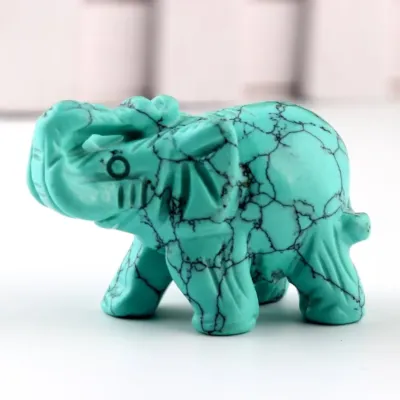
Turquoise Chakra Connections
Turquoise is strongly associated with the throat chakra. It enhances communication skills and self-expression. In an age of digital communication, many find turquoise helpful in articulating thoughts and fostering honest, open dialogue.
It is also connected to the third eye chakra, as it promotes and helps with intuition.
Zodiac Associations
Sagittarius: Turquoise is strongly linked to Archers (November 22 – December 21). It improves their natural curiosity, optimism, and adventurous spirit. The stone also helps Sagittarians stay grounded and connected to their spiritual journey. It brings wisdom and clarity to their pursuits.
Pisces: The Fishes sign (February 19 – March 20) also resonates well with turquoise. The stone helps Pisceans navigate emotional waters and provides clarity and balance during turbulent times. It supports their creative expression and emotional stability.
Turquoise Properties
| Chemical formula: | CuAl6(PO4)4(OH)8 · 4H2O |
| Crystal System: | Triclinic |
| Mohs hardness: | 5-6 |
| Locations: | Worldwide, mainly in the USA, Egypt, Iran, Australia, Mexico, and China |
Chemical Composition of Turquoise
Turquoise is a hydrous phosphate of copper and aluminum. The chemical formula is CuAl6(PO4)4(OH)8 · 4H2O.
Turquoise Mineral Properties
Turquoise grows in a triclinic crystal system, although translucent (see-through) crystals are rare. Most turquoise is found as opaque (solid color) globular crusts.
Where is turquoise found?
Turquoise is found worldwide. Currently, the leading producer of turquoise by value is Arizona, US, with other significant mines in Nevada and New Mexico.
Internationally, mines on the Sinai Peninsula have been exploited for over 7,000 years, making them some of the oldest known sources of turquoise. Some of the highest quality turquoise comes from historical Iranian mines. Other significant deposits are in Australia and Mexico.
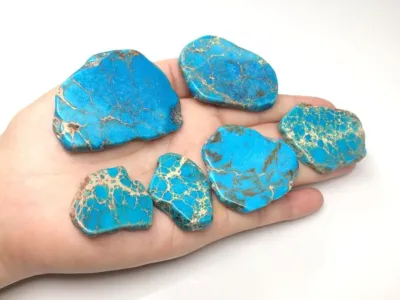
Turquoise Hardness
Turquoise scores only 5 – 6 on the Mohs scale, so it is a relatively soft stone that scratches easily. Not only that, the natural stone is very porous and often chalky.
The Gemological Institute of America (GIA) recognizes several common and approved turquoise treatments to make it more durable and polishable for use in jewelry. The most common is stabilization, where the rough stone is soaked in an epoxy solution under pressure.
Just about every stone on the market has been stabilized. The few natural gem-quality stones that have not been treated are very rare and highly prized.
Turquoise Jewelry Ideas
Turquoise is a unique, timeless gem. It is an excellent and affordable choice that is available in many designs.
Turquoise matches well with both casual and formal looks, making a very versatile jewelry.
Turquoise Necklaces
Sterling Silver Necklace
A sterling silver necklace with turquoise is both classic and elegant. While there are many designs, we like this multi-stone necklace with a feature pendant. You can never have too many stones!
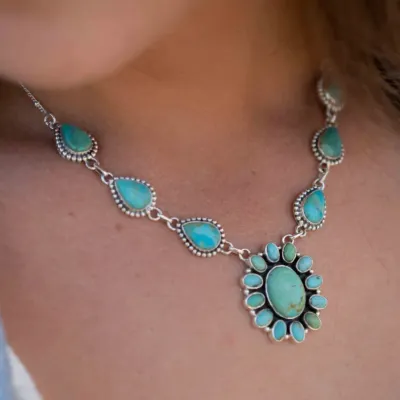
Rich and delicate 925 sterling silver necklace with turquoise stones and large multi stone feature pendant.
Handmade Natural Turquoise Necklace
Turquoise pieces with their unique patterns are perfect for creating something personal. This handmade necklace is unique, as no two stones are the same. Your turquoise necklace will be a one-off piece.
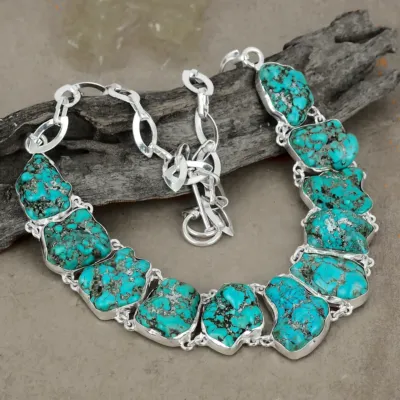
Handmade necklace from natural Tibetan turquoise set in 925 sterling. A one-off piece as unique as you.
Turquoise Bracelets
Bracelets Featuring Turquoise and Gemstones
Bracelets combining turquoise with other gems can add a pop of color to your wrist. This design from Angara is customizable – choose the quality of your stone and white, rose, or yellow gold to match your skin.
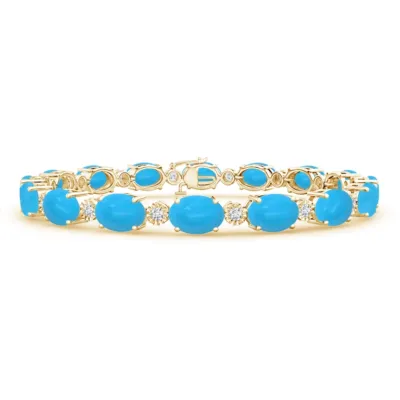
Be unique: customize the stone or metal in this stunning turquoise and diamonds bracelet.
Turquoise Paired With Silver Accents
Turquoise set in polished silver makes for stylish and elegant everyday wear! Here is one stunning piece for you.
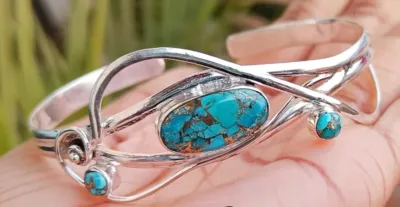
Stunning copper turquoise in intricate sterling silver bracelet.
Turquoise Earrings
From studs to dangling designs, earrings featuring turquoise are versatile for any occasion, both formal and casual.
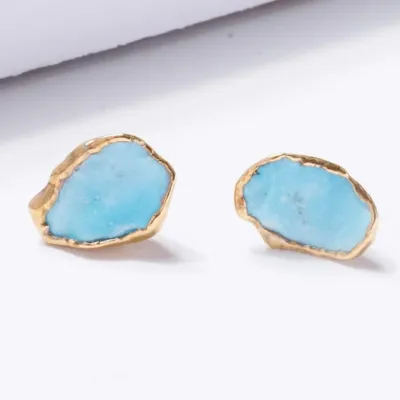
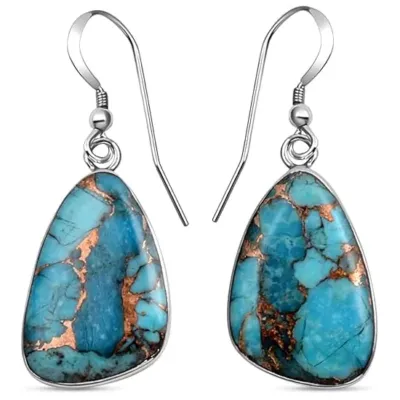
Affordable earrings made from copper-infused turquoise set in 925 sterling silver.
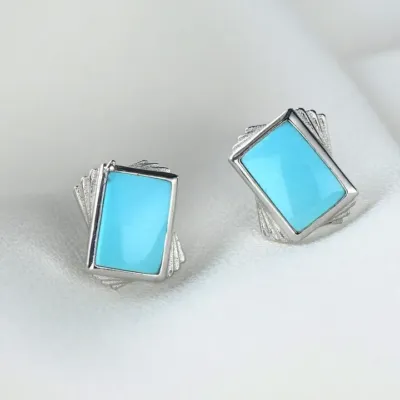
Turquoise Rings
Rings are another way to wear the stone. They can be both bold and simple, from minimal bands to larger statement pieces. Here is one statement ring with a large feature stone we love.
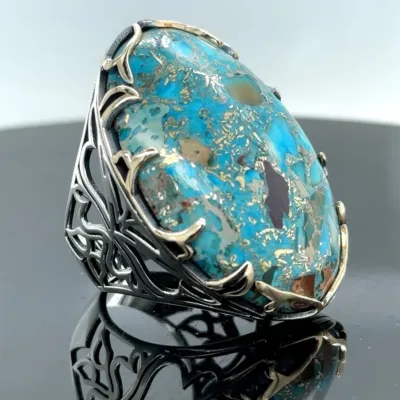
Feature oval turquoise stone set in 925k sterling silver, handmade in an Ottoman style.
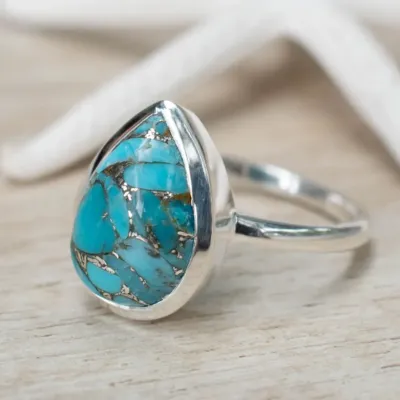
Male Turquoise Rings
Men’s turquoise rings are more than just bold accessories—they’re symbols of protection, balance, and personal strength. Worn for centuries, turquoise is believed to promote inner peace, trust, and emotional stability. Whether as a statement piece or a meaningful talisman, a turquoise ring adds both style and positive energy to everyday wear.
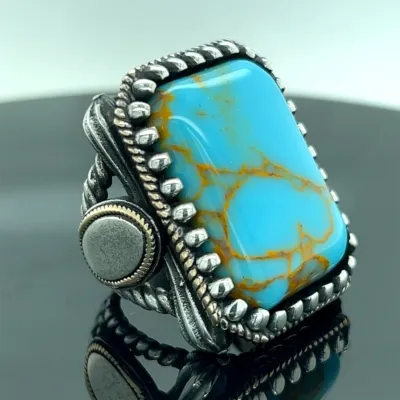
925k sterling silver large square handmade ring in Ottoman style.
Turquoise Jewelry Sets
Turquoise combines well with mother-of-pearl or other gems to create eye-catching designs. Harmonious contrast is the name of the game. Here is one such set we like – a matching necklace and earrings.
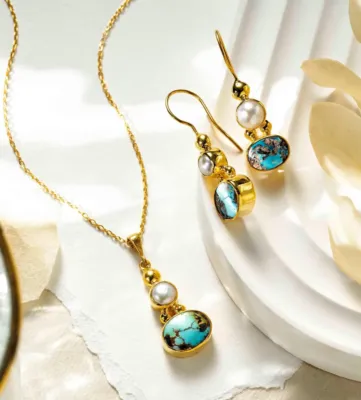
Turquoise with natural pearl jewelry set in 18K gold vermeil silver.
Gift Sets With Matching Items
Coordinated sets that include necklaces, rings, bracelets, or earrings make an excellent gift idea for loved ones who treasure harmonious looks.
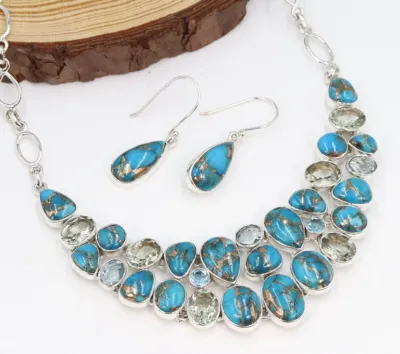
A bold necklace featuring copper-infused turquoise combined with blue topaz, set in sterling silver. Plus matching earrings.
Well, as you can see, there are many great options for wearing your turquoise. We hope that you enjoy the pieces above as much as we do. There are some great works of art and craftsmanship that show off the unique color and texture of the ancient stone. Being affordable and eye-catching, turquoise is as popular today as it was thousands of years ago.
How to Care For And Clean Turquoise Jewelry
While stabilized turquoise will last you a lifetime, you will still need to treat it as a softer stone:
- Keep it away from oils and lotions
Perfumes, oils, lotions, and other chemicals might discolor your turquoise. Let your skin dry completely before putting on your jewelry. - Prevent water damage
Turquoise does not like water. A deep soak could soften it and make it crumble. Always remove your rings or bracelets before showering, swimming, or washing dishes. - Do not wear it during strenuous activities
It is easy to accidentally scratch or chip turquoise during rough activities like gardening or sports. Also, your perspiration may discolor the stone. You are better taking it off. - Clean with a soft cloth
Wipe turquoise with a damp, soft cloth. Do not use harsh chemicals or abrasives, as they can damage the surface. - Check jewelry settings regularly
If the stone becomes loose in its setting over time, have the jewelry inspected and repaired by a professional. - Store it safely
When not worn, put your jewelry in a separate jewelry box or soft pouch to prevent scratching from harder stones. Store it away from sunlight or extreme heat to avoid any cracks.